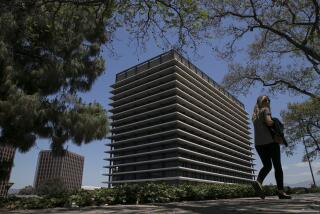Renewable-Energy Lifestyle
Re “A Greener DWP Is Needed,” editorial, March 29: In the mid-1970s, after the oil embargo, I installed a solar hot water system on the roof of my home that allowed me to heat and cool my home, provide hot water for showers and heat the swimming pool. It paid for itself in less than three years and I am still benefiting from the system. I am now considering installing a photovoltaic system for generating electricity.
I am completely sold on the benefits of renewable energy and thank The Times for speaking out in favor of a cleaner energy future for Los Angeles. The Department of Water and Power should meet or exceed the state’s clean energy standard of 20% renewable energy sources by 2017.
Increasing our reliance on renewable energy makes us less vulnerable to price hikes and blackouts and reduces pollution.
Ted Williams
Los Angeles
*
I have biked to work for five years now, three of them in Los Angeles. I live near the beach on the Westside and never go farther than Century City, so I always figured the air was suitable for consumption (hoping the sea air would help me out).
However, after living here for about a year, I started to experience a considerable cough. Now my concern is that something I have always considered healthy for mind and body is actually setting me up for bigger problems. I have asked my doctor, and her response is that they don’t have enough data to determine my risk. I would wear a face mask if someone had enough data to know what kind would help.
I urge our city to take this seriously, as I do not want to become data on cancer risk. How are we to encourage alternative forms of transportation when it results in a major health risk? People who exercise in this city, and there are a lot of us, deserve to feel safe doing so.
Heather Field
Venice
*
In his March 28 letter, Robert Seldon professed that driving his Toyota electric vehicle did not contribute “one dime to the oil despots.”
Unless he knows that his vehicle’s energy comes from a hydroelectric dam or he takes it from his home solar-powered electric system, he must purchase it from some fossil-fueled power plant -- with most of his money going to the oil despots. It is time for this nation to wake up and accept the fact that neither direct solar nor hydro can provide a significant portion of our current energy needs, much less the additional needs of an ever-growing population.
There are currently only two viable sources of power at the rate we consume. Since as a nation we cannot come to grips with nuclear, that leaves only one source of power to heat, cool and light our homes and workplaces, to power our manufacturing enterprises and for all our transportation needs, including Seldon’s EV car. A world of EVs powered from nuclear power plants would not depend on foreign oil sources and would be low in real-time pollution. But battery cars powered from fossil-fueled power plants are no more oil-efficient than internal combustion because of battery losses. All they do is relocate pollution to someone else’s neighborhood. That is not efficient, strategic or even neighborly.
Jerry Counts
Canoga Park
*
I’m writing to thank The Times for speaking out in favor of a cleaner energy future for Los Angeles. I recently bought a hybrid car and have been educating myself and others on how easy and critically important it is that we act now to address these issues on every level -- from federal to municipal to individual. Increasing our reliance on renewable energy makes us less vulnerable to price spikes and blackouts, reduces pollution ... and it’s just the right thing to do.
It’s absurd that the Los Angeles Department of Water and Power has remained exempt from standards widely applied elsewhere.
Rebecca Metz
Los Angeles
More to Read
Inside the business of entertainment
The Wide Shot brings you news, analysis and insights on everything from streaming wars to production — and what it all means for the future.
You may occasionally receive promotional content from the Los Angeles Times.










